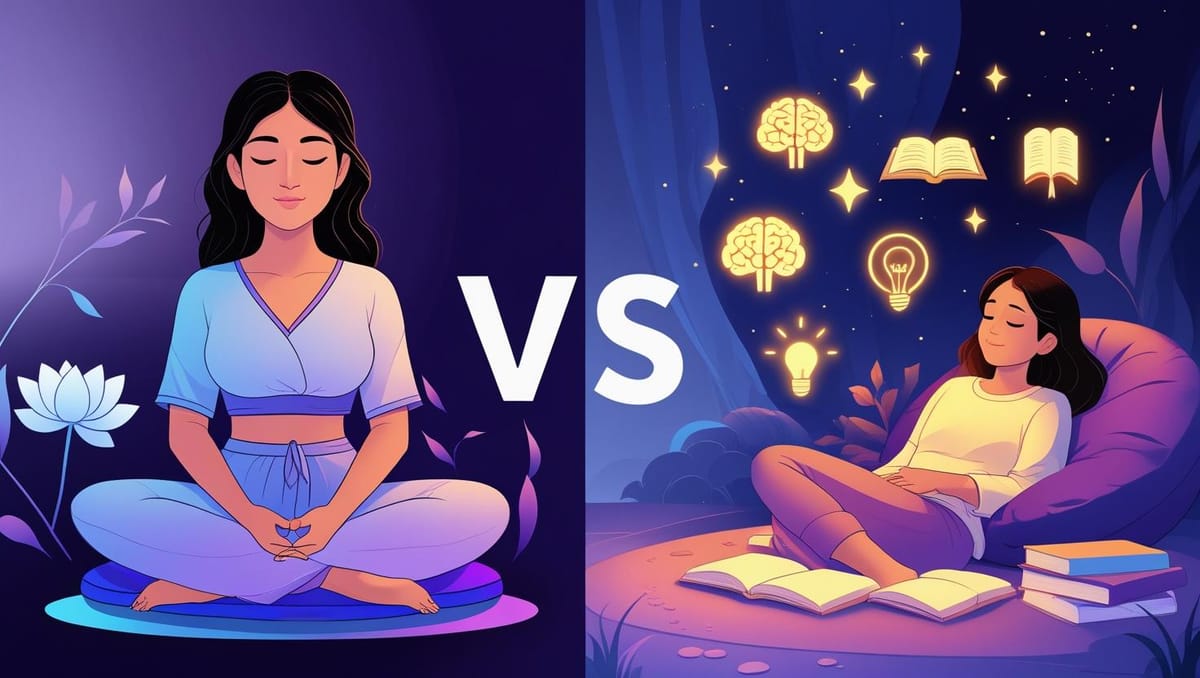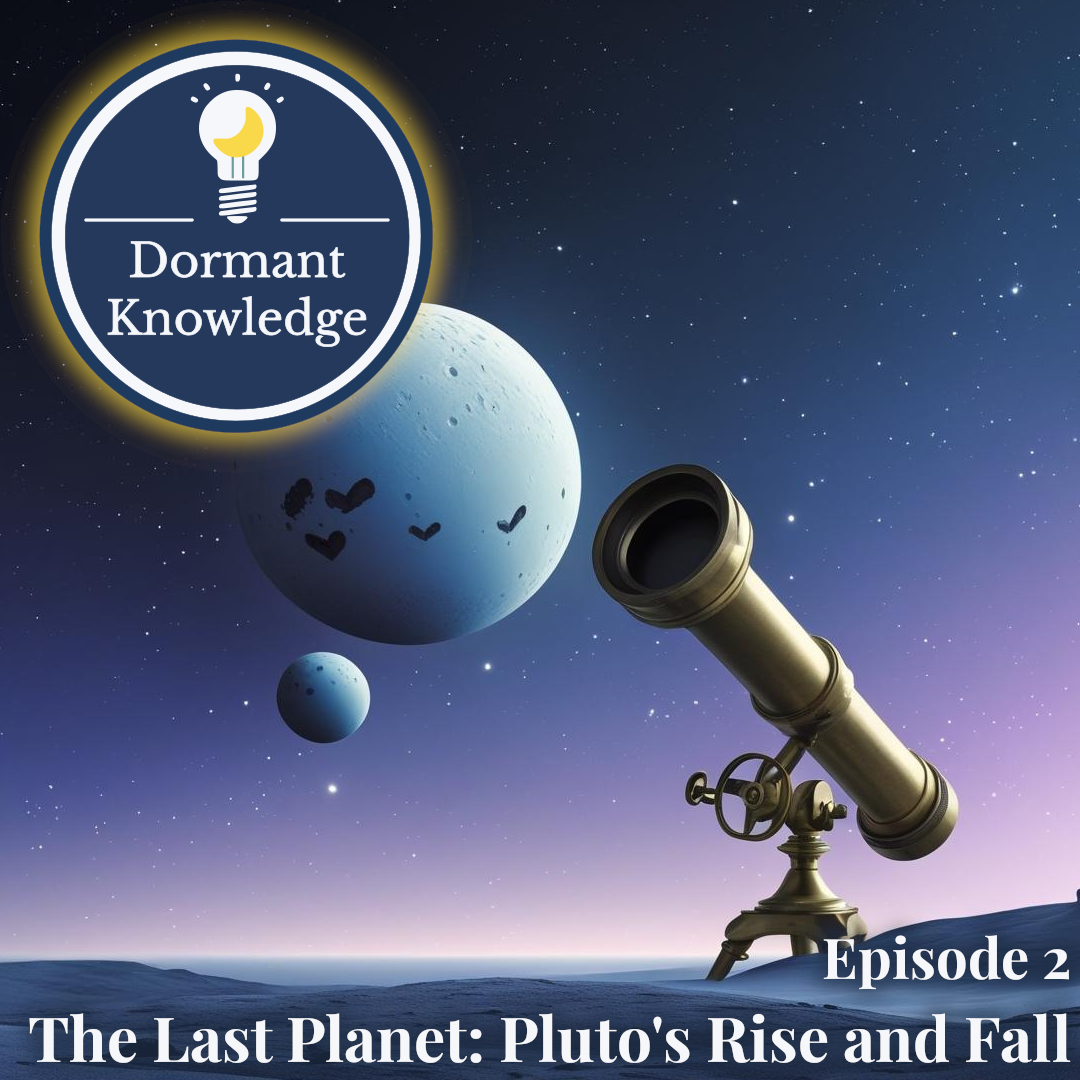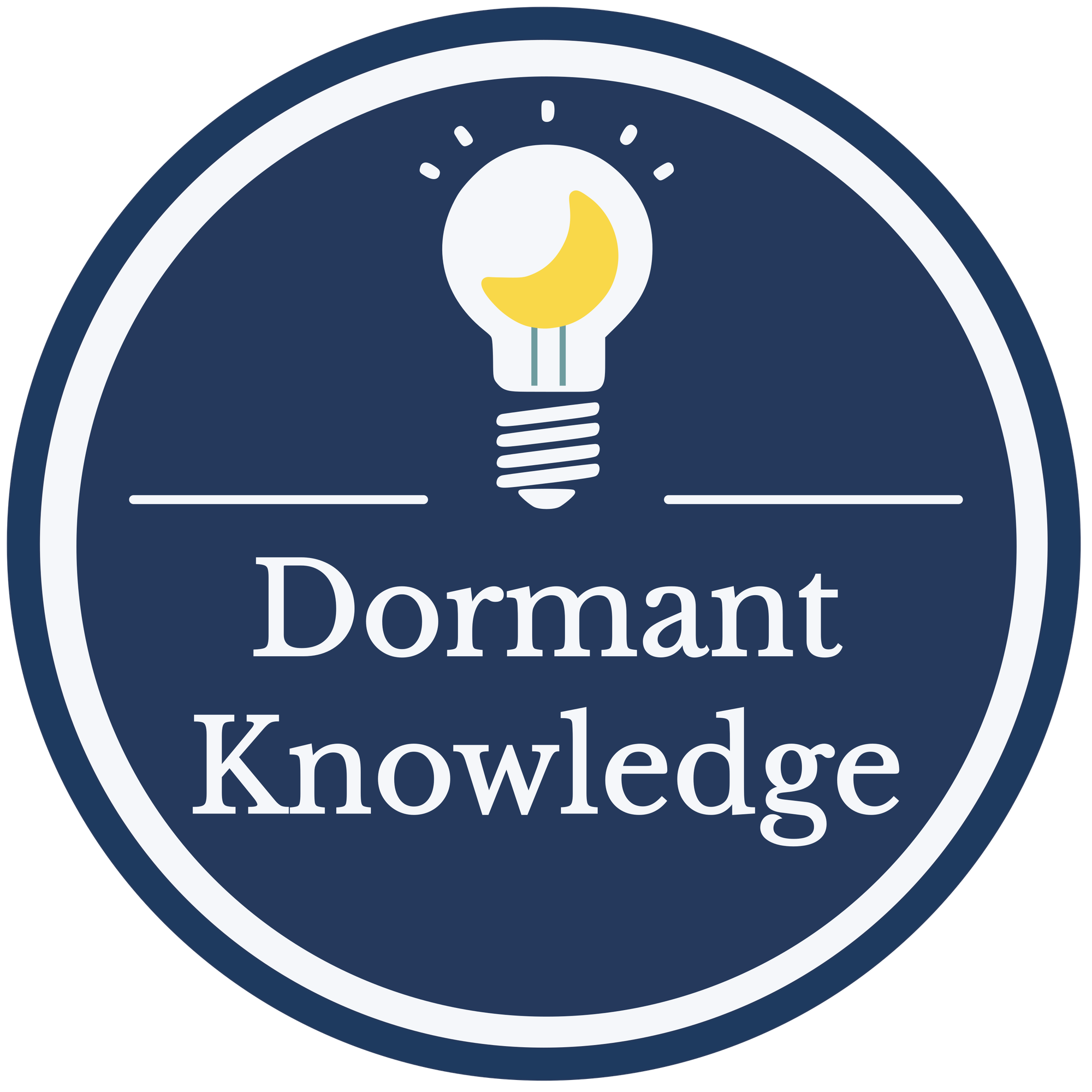Sleep Podcasts vs. Meditation Apps: Which Is Better for Learning?
If you're torn between downloading another meditation app or exploring the world of sleep podcasts for learning, this comprehensive comparison will help you understand which approach best serves your goals for both rest and intellectual growth.

As millions of people struggle with both sleep issues and finding time for personal development, two popular solutions have emerged: meditation apps and educational sleep podcasts. Both promise to help you unwind at bedtime, but only one offers the unique opportunity to actually learn something fascinating while you drift off to sleep.
If you're torn between downloading another meditation app or exploring the world of sleep podcasts for learning, this comprehensive comparison will help you understand which approach best serves your goals for both rest and intellectual growth.
The Fundamental Difference
Meditation apps focus primarily on achieving mental quiet through guided relaxation, breathing exercises, and mindfulness practices. Popular apps like Headspace, Calm, and Insight Timer excel at helping users reduce anxiety and achieve a peaceful mental state conducive to sleep.
Educational sleep podcasts like Dormant Knowledge take a different approach: they combine genuine learning with sleep-inducing delivery methods. Instead of emptying your mind, they gently fill it with fascinating information presented at a pace and tone specifically designed to promote relaxation while satisfying intellectual curiosity.
The key question becomes: Do you want to fall asleep to silence and emptiness, or to the gentle whisper of knowledge being absorbed by your drowsy mind?
When Meditation Apps Excel
Meditation apps shine in several specific scenarios:
For High Anxiety Sleepers: If racing thoughts or anxiety are your primary sleep obstacles, meditation apps offer proven techniques for calming an overactive mind. The guided breathing exercises and progressive muscle relaxation can effectively interrupt worry cycles.
For Meditation Practitioners: People already committed to mindfulness practices often find bedtime meditation a natural extension of their daily routine. The apps provide structure and guidance for those building a consistent meditation habit.
For Simplicity Seekers: Some individuals prefer the straightforward approach of clearing their minds rather than processing new information before sleep. Meditation apps excel at creating mental space and quiet.
For Sleep Onset Issues: Research shows that meditation techniques can be particularly effective for people who struggle with the initial transition from wakefulness to sleep.
Where Educational Sleep Podcasts Outshine Meditation Apps
However, educational sleep podcasts offer unique advantages that meditation apps simply cannot match:
Dual-Purpose Efficiency
The most compelling advantage of educational sleep podcasts is their efficiency. While meditation apps serve one primary function (helping you relax) sleep podcasts like Dormant Knowledge serve two: relaxation AND education.
For busy individuals who feel guilty about "unproductive" time spent on self-care, educational sleep podcasts eliminate this conflict entirely. You're simultaneously taking care of your sleep needs and feeding your intellectual curiosity.
Engaging Without Energizing
Many people find pure meditation too under-stimulating or even boring, leading to mind-wandering that actually increases anxiety. Educational sleep podcasts solve this problem by providing just enough intellectual engagement to capture attention without creating the mental arousal that prevents sleep.
Our Dormant Knowledge listeners frequently report that learning about topics like Pluto's discovery or the history of calculus provides the perfect level of "soft fascination". They are interesting enough to prevent anxious thoughts, yet gentle enough to promote relaxation.
Long-Form Content for Extended Sleep Support
Most meditation app sessions last 10-20 minutes, which works well for sleep onset but provides no support if you wake up during the night. Educational sleep podcasts typically run 45-60 minutes, offering extended comfort for those who need audio support throughout the night or who take longer to fall asleep initially.
Intellectual Satisfaction
For naturally curious individuals, meditation apps can feel intellectually unsatisfying. Educational sleep podcasts feed the mind while calming it, providing a sense of accomplishment and growth that pure relaxation techniques cannot offer.
The Science Behind Sleep Learning
Research supports the unique benefits of educational content during the transition to sleep. Studies have shown that the drowsy brain state is particularly receptive to absorbing abstract concepts and broad patterns. This is exactly the type of learning that occurs with educational sleep podcasts.
Dr. Matthew Walker, author of "Why We Sleep," explains that "when it comes to info processing, think of the wake state principally as reception (experiencing and constantly learning the world around you), NREM sleep as reflection (storing and strengthening those raw ingredients of new facts and skills), and REM sleep as integration."
This means that educational content consumed during the drowsy transition state can actually be processed and integrated more effectively than information learned during full wakefulness.
Additionally, research on "awe-inducing" content—like the cosmic scales discussed in space-themed episodes—shows that such material naturally promotes the parasympathetic nervous system response associated with relaxation and sleep readiness.
You can read more about the science of Sleep Learning in our previous post:

Comparing User Experiences
Meditation App Users Report:
- Effective for reducing immediate anxiety
- Helpful for building mindfulness skills
- Sometimes struggle with mind-wandering during sessions
- May need multiple apps to find preferred style
- Often feel the need for additional intellectual stimulation
Educational Sleep Podcast Users Report:
- Satisfaction from learning while relaxing
- Reduced guilt about "unproductive" bedtime routines
- Better engagement than pure meditation
- Improved sleep quality when content matches interests
- Unique combination of relaxation and intellectual fulfillment
Which Approach Is Right for You?
Choose Meditation Apps If You:
- Have high anxiety or racing thoughts at bedtime
- Already practice meditation regularly
- Prefer simplicity and minimal cognitive engagement
- Struggle specifically with sleep onset rather than sleep maintenance
- Find any information processing stimulating rather than calming
Choose Educational Sleep Podcasts If You:
- Want to learn while you relax
- Find pure meditation boring or under-stimulating
- Enjoy intellectual content but lack time for learning during the day
- Need longer audio support throughout the night
- Want to feel productive even during rest time
- Are naturally curious about the world
The Hybrid Approach
Some sleep optimization experts recommend combining both approaches strategically:
Meditation apps for crisis moments: When anxiety is particularly high or stress levels are overwhelming, meditation apps provide immediate, targeted relief.
Educational sleep podcasts for routine: For regular nightly use, educational sleep podcasts offer the sustainable engagement and dual benefits that support long-term sleep habits.
Why Dormant Knowledge Represents the Best of Sleep Podcast Learning
As an educational sleep podcast specifically designed for curious minds, Dormant Knowledge exemplifies the ideal balance between learning and relaxation:
Carefully Curated Content: Topics like the history of calculus, Pluto's discovery, and the invention of the light bulb are chosen for their intellectual interest without emotional charge or practical urgency.
Sleep-Optimized Delivery: Host Deb's conversational pace, natural speech patterns, and gentle tangents create the perfect rhythm for drowsy absorption.
Appropriate Length: 45-minute episodes provide extended support without being overwhelming, ideal for both sleep onset and maintenance.
Intellectual Depth: Unlike simplified "sleep stories," episodes offer genuine educational value that satisfies adult curiosity while promoting relaxation.
Frequently Asked Questions
Q: Can educational sleep podcasts actually help me learn new information? A: Research suggests that the drowsy brain is particularly good at absorbing abstract concepts, broad patterns, and general knowledge. While you shouldn't expect to master complex skills through sleep learning, you can definitely expand your knowledge base and gain new perspectives on fascinating topics.
Q: What if educational content keeps me awake instead of helping me sleep? A: This depends on both content selection and delivery style. Educational sleep podcasts like Dormant Knowledge are specifically designed with sleep-inducing pacing and non-stimulating topics. If you find certain subjects too engaging, try switching to different episode topics until you find your ideal balance.
Q: How do educational sleep podcasts compare to audiobooks for bedtime? A: Most audiobooks are designed for active listening and can be too engaging or emotionally charged for sleep. Educational sleep podcasts are specifically crafted with slower pacing, calming topics, and delivery styles that promote rather than prevent sleep.
Q: Should I use headphones or speakers for sleep podcast listening? A: This is largely personal preference. Headphones can provide better sound isolation but may be uncomfortable for side sleepers. Speakers work well if they don't disturb others. Many listeners use sleep-specific headphones designed for comfortable nighttime wear.
Q: Can I combine meditation apps and educational sleep podcasts? A: Absolutely. Many people use brief meditation app sessions (5-10 minutes) to initially calm their minds, then switch to educational sleep podcasts for the remainder of their bedtime routine.
The Bottom Line
While meditation apps serve an important role in the sleep wellness ecosystem, educational sleep podcasts offer a unique value proposition that pure meditation cannot match: the opportunity to grow intellectually while caring for your sleep needs.
For the millions of curious individuals who feel stretched thin between work, life responsibilities, and personal development goals, educational sleep podcasts represent a revolutionary approach to making the most of bedtime hours.
Rather than viewing sleep preparation as empty time or necessary boredom, educational sleep podcasts transform those precious 45-60 minutes into an opportunity for gentle learning and intellectual satisfaction, all while providing the relaxation benefits your body needs for restorative sleep.
The choice ultimately depends on your personal needs, but for those who want to feed both their minds and their sleep requirements, educational sleep podcasts like Dormant Knowledge offer an unmatched combination of intellectual growth and peaceful rest.
Ready to experience the unique benefits of educational sleep learning? Try Episode 2 of Dormant Knowledge, where you'll explore the fascinating story of Pluto while gently drifting toward sleep. Available now on all major podcast platforms.

About Dormant Knowledge: We're the educational sleep podcast for curious minds who want to learn fascinating topics while gently drifting off to sleep. Follow us @dormantknowledge on Instagram and Facebook, or @drmnt_knowledge on X. Visit dormantknowledge.com for episodes, transcripts, and more sleep learning resources.






